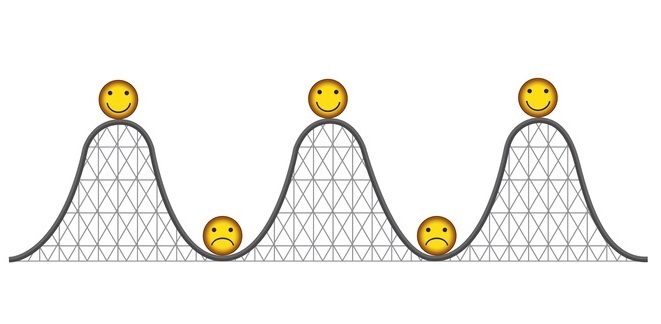
Most of my life I’ve lived with mood swings. Bigger, wilder, and scarier in my youth, milder and moderated in my mature years, the benefit of years and years of largely self-administered cognitive behavior therapy. Cognitive behavior therapy being just a fancy phrase for self-work, desperate search for self-awareness, decades of journaling and voracious reading with a bit of self-discipline thrown in.
These days, the down side of my cycle is more likely a plateauing of my energy, a leveling of my driven nature, a far cry from the descending of the “Black Blanket” (see footnote re Winston Churchill and his “blackdogs”) over me that I experienced in my younger days. I can’t say I like my plateaus, I do miss the energizing zest of my up moods and I wonder to what extent I participate in their creation. Do I crest too high? Do my beliefs, particularly about my past and my inherent nature, in any way form the seed for their generation? Am I responsible in any way for their existence? How can I be my best self more often? Or are my plateaus as necessary a “downtime” (is that even the best frame?) as sleep?
Mostly, however, I ride them out, confident they will dissipate and I resolve to use them as a time of rest, renewal, and recuperation.
Closing Quotes:
“There are no limits. There are only plateaus, and you must not stay there, you must go beyond them.” – Bruce Lee
“Tall peaks are not always better than long plateaus as true greatness must include protracted excellence.” – Matthew Hayden
“Our life’s journey of self-discovery is not a straight-line rise from one level of consciousness to another. Instead, it is a series of steep climbs and flat plateaus, then further climbs.” – Stuart Wilde
“Like success, failure is many things to many people. With Positive Mental Attitude, failure is a learning experience, a rung on the ladder, a plateau at which to get your thoughts in order and prepare to try again.” – W. Clement Stone
“Every leader will hit a series of plateaus in their lives. The key is not to say there, because settling on a plateau can easily lead to an elongated season of comfort. Being comfortable is one of the leader’s worst enemies.” – Gary Rohrmayer
Footnote:
Winston Churchill named it his “black dog“, following Samuel Johnson (who, like many great men, suffered from the great disease of manic-depression). Churchill was so paralyzed by despair that he spent time in bed, had little energy, few interests, couldn’t concentrate. When Churchill was almost 80, Dr. Moran prescribed some speed to give Sir Winston enough of a boost to make a final speech in Parliament.
As always, I share what I most want and need to learn. – Nathan S. Collier


0 Comments